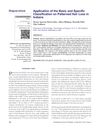 8 citations,
January 2013 in “International Journal of Trichology”
8 citations,
January 2013 in “International Journal of Trichology” The BASP classification is effective for diagnosing pattern hair loss in Indian men and women.
 5 citations,
December 2004 in “Dermatology”
5 citations,
December 2004 in “Dermatology” Two women with very high androgen levels had only slight skin issues, one due to a non-classical adrenal disorder and the other due to an adrenal tumor.
 32 citations,
April 2015 in “British Journal of Dermatology”
32 citations,
April 2015 in “British Journal of Dermatology” The hair shedding scale accurately identifies abnormal hair shedding in women with long hair, with grades 5 and 6 indicating excessive shedding.
 21 citations,
May 2017 in “International Journal of Dermatology”
21 citations,
May 2017 in “International Journal of Dermatology” Overweight smokers have worse hair loss.
 30 citations,
September 2017 in “Clinics in Dermatology”
30 citations,
September 2017 in “Clinics in Dermatology” Men with common hair loss may have a higher risk of heart disease and diabetes, and should be checked for these conditions.
 May 2024 in “Medicine today”
May 2024 in “Medicine today” Older age, family history, and low iron levels increase the risk of female hair loss.
 11 citations,
August 2021 in “Stem Cell Research & Therapy”
11 citations,
August 2021 in “Stem Cell Research & Therapy” The document concludes that using a person's own fat cells (SVF) can significantly increase hair thickness and density, suggesting it could be a promising treatment for hair loss.
 May 2023 in “International Journal of Trichology”
May 2023 in “International Journal of Trichology” PRP therapy for hair loss is safe but its effectiveness is doubtful.
January 2019 in “Journal of the Egyptian Women's Dermatologic Society (Print)” People with androgenetic alopecia have a higher risk of heart disease.
 157 citations,
July 2001 in “British Journal of Dermatology”
157 citations,
July 2001 in “British Journal of Dermatology” AGA more common in men, Koreans have lower rates and unique patterns.
June 2021 in “Egyptian Journal of Dermatology and Venereology” Psoriasis, acne, and hair loss are linked to unhealthy cholesterol levels, increasing heart disease risk.
 37 citations,
April 2012 in “British Journal of Dermatology”
37 citations,
April 2012 in “British Journal of Dermatology” Female hair loss linked to metabolic syndrome, not in males.
14 citations,
January 2018 in “Indian Journal of Dermatology, Venereology and Leprology” Adding low-level light therapy to minoxidil improves hair growth and patient satisfaction.
13 citations,
August 1991 in “The Journal of the American Osteopathic Association”  18 citations,
May 2013 in “Annals of Dermatology”
18 citations,
May 2013 in “Annals of Dermatology” AGA increased yearly, type I most common, and family history and seborrheic dermatitis often linked.
 14 citations,
September 2020 in “Dermatologic Therapy”
14 citations,
September 2020 in “Dermatologic Therapy” Oral minoxidil improves hair density in women with androgenetic alopecia, with mild side effects.
23 citations,
January 2016 in “International Journal of Trichology” Women with female pattern hair loss have lower Vitamin D3 levels.
 2 citations,
March 2021 in “Cosmetics”
2 citations,
March 2021 in “Cosmetics” Hair transplant surgery is the most effective, safe, and satisfying treatment for hair loss.
November 2022 in “Journal of Cosmetic Dermatology” The combined therapy significantly increased hair density and was safe for treating hair loss.
 19 citations,
January 2018 in “Acta dermato-venereologica”
19 citations,
January 2018 in “Acta dermato-venereologica” People with alopecia areata have higher levels of a heart disease marker than those without hair loss.
 1 citations,
January 2016 in “Journal of stem cell research and medicine”
1 citations,
January 2016 in “Journal of stem cell research and medicine” Fat-derived stem cell therapies can potentially increase hair growth and thickness in people with hair loss.
August 2024 in “Nutrients” Probiotics help reduce hair loss and increase hair growth in people with androgenic alopecia.
 21 citations,
June 2019 in “Dermatologic Surgery”
21 citations,
June 2019 in “Dermatologic Surgery” Platelet-rich plasma (PRP) treatment has been found effective in promoting hair growth for alopecia patients, with minimal side effects like temporary pain and redness.
 15 citations,
May 2020 in “Journal of Dermatological Treatment”
15 citations,
May 2020 in “Journal of Dermatological Treatment” PRP treatment increases hair density and thickness in androgenetic alopecia by 79%.
1 citations,
December 2022 in “Archives of Dermatological Research” SVF injections improve hair growth and reduce hair loss in people with androgenic alopecia.
 1 citations,
January 2019 in “Springer eBooks”
1 citations,
January 2019 in “Springer eBooks” Hidradenitis Suppurativa is a chronic skin condition best treated early with surgery for better outcomes and less recurrence.
 July 2022 in “Nigerian journal of medicine : journal of the National Association of Resident Doctors of Nigeria”
July 2022 in “Nigerian journal of medicine : journal of the National Association of Resident Doctors of Nigeria” Androgenetic Alopecia (AGA) greatly lowers quality of life, causing stress and low self-esteem, with those seeking treatment experiencing more impairment.
 October 2020 in “Veterinary Dermatology”
October 2020 in “Veterinary Dermatology” New treatments and diagnostic methods for various animal skin conditions showed promising results.
 January 2012 in “Elsevier eBooks”
January 2012 in “Elsevier eBooks” Hair transplantation is highly effective with careful technique and attention to patient needs.
 21 citations,
January 2012 in “Annals of Dermatology”
21 citations,
January 2012 in “Annals of Dermatology” 17α-Estradiol solution safely improves hair density and thickness in female pattern hair loss.






















